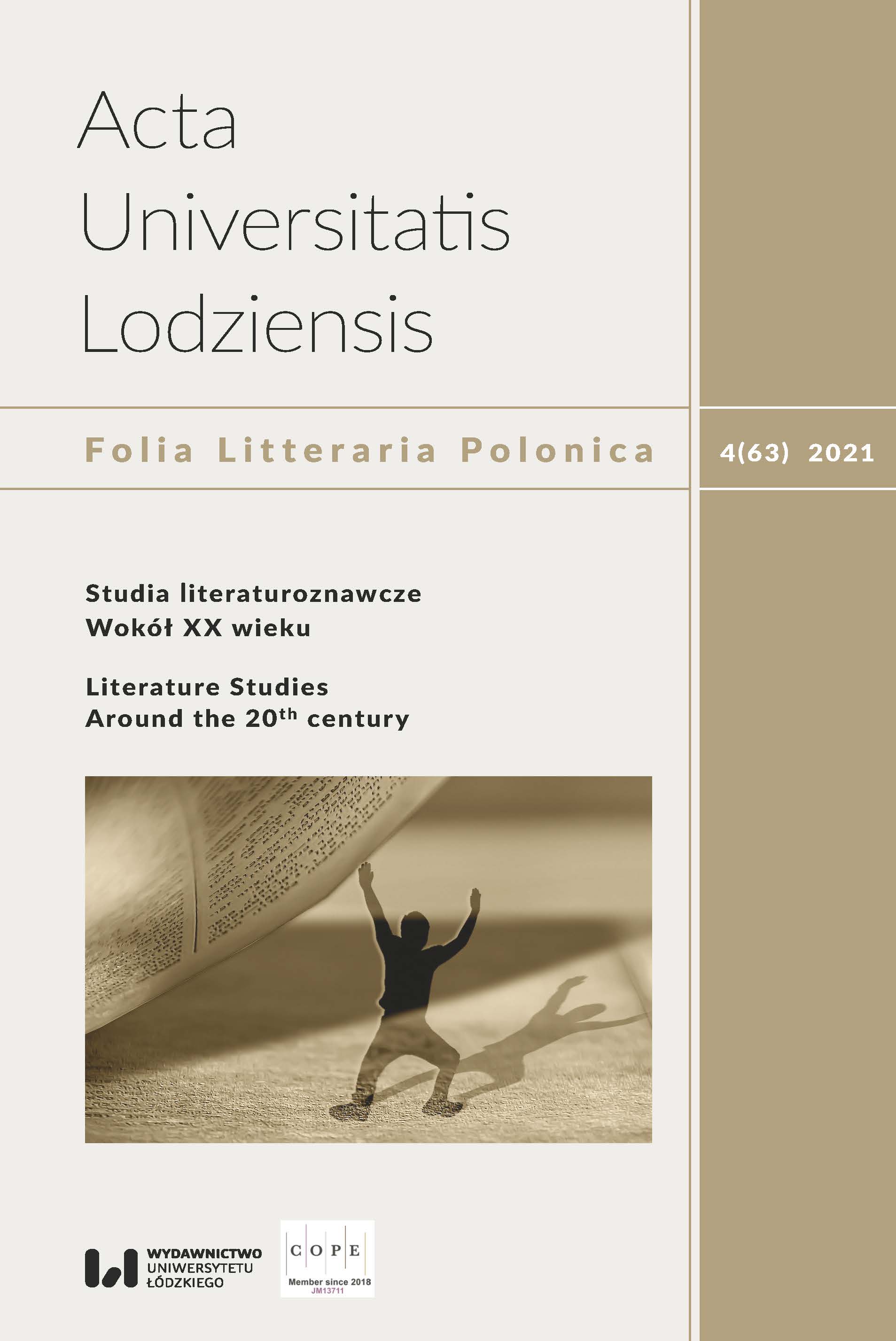Beckett’s Dystopian Trilogy, Part I: The Irrelevance of Godot
DOI:
https://doi.org/10.18778/1505-9057.63.01Keywords:
Samuel Beckett, Waiting for Godot, genetic criticism, phrenologyAbstract
The article concentrates on a variety of textual alterations introduced to Samuel Beckett’s Waiting for Godot either in the process of translation by the author or by the third parties. In a close reading of these changes the article follows the philosophy of human degradation and connects it both with Beckett’s own ideas on the matter and with a broad cultural context of the epoch. Apart from this philological and cultural analysis, the article advances a thesis that the main theme of Beckett play is not necessarily the absence of Godot/God, or a figure of authority, but the fact of humanity slowly descending into stagnation, depletion of energy and hope as well as physical deprivation. Therefore the article offers an interesting study of Beckett from textual and cultural perspectives, but it also makes a contribution to the genetic criticism of his oeuvre.
Downloads
References
Atkinson Brooks, Beckett’s Wating for Godot, „The New York Times”, 20.04.1956, https://archive.nytimes.com/www.nytimes.com/books/97/08/03/reviews/beckett-godot.html?_r=1 [dostęp: 12.01.2022].
Google Scholar
Beckett Samuel, Czekając na Godota, tłum. A. Libera, Państwowy Instytut Wydawniczy, Warszawa 1994.
Google Scholar
Beckett Samuel, Końcówka, [w:] Samuel Beckett, Dramaty, tłum. i oprac. A. Libera, Zakład Narodowy im. Ossolińskich, Kraków 1995, s. 111–175.
Google Scholar
Beckett Samuel, The Letters of Samuel Beckett, 1941–1956, red. G. Craig et al., Cambridge University Press, Cambridge 2009.
Google Scholar
Beckett Samuel, The Theatrical Notebooks of Samuel Beckett, Volume I: “Waiting for Godot”, red. James Knowlson, Faber and Faber, London, Grove Press, New York 2019 [1994].
Google Scholar
Beckett Samuel, Waiting for Godot (1953). Numerowana kopia oznaczona jako Albery. BDMP MS-HRC-DA-145-1and HRC Texas.
Google Scholar
Beckett Samuel, Waiting for Godot, Faber and Faber, London 1956. Beckett Samuel, Waiting for Godot, Faber and Faber, London, 1965. Beckett Samuel, Waiting for Godot. Grove Press, New York 1954.
Google Scholar
Beckett Samuel, Waiting for Godot, Lord Chamberlain Plays LCP 1964/51, British Library, London 1964.
Google Scholar
Beckett Samuel, Waiting for Godot. Nienumerowana kopia oznaczona jako OSU. Columbus, Ohio.
Google Scholar
Calloway Stephen, Aubrey Beardsley, V & A Publications, London 1998.
Google Scholar
Deleuze Gilles, Claire Parnet, Dialogues II, tłum. Hugh Tomlinson i Barbara Habberjam, Columbia University Press, New York 2007.
Google Scholar
Hobbes Thomas, Lewiatan, czyli materia, forma i władza państwa kościelnego i świeckiego, tłum. C. Znamierowski, Państwowe Wydawnictwo Naukowe, Kraków 1954.
Google Scholar
McMillan Dougald, Martha Fehsenfeld (red.), Beckett in the Theater: The Author as Practical Playwright and Director, Riverrun, New York 1988.
Google Scholar
Nordeau Max, Degeneration, tłum. z drugiego wydania niemieckiego, D. Appleton and Company, New York 1895.
Google Scholar
Owens Susan, The Satirical Agenda of Aubrey Beardsley’s Enter Herodias, „Visual Culture in Britain” 2002, nr 2:3, s. 81–102.
Google Scholar
RabatéJean-Michel,Think,Pig!BeckettandtheLimitsoftheHuman,NewYorkUniversity Press, New York 2016. https://doi.org/10.5422/fordham/9780823270859.001.0001
Google Scholar
DOI: https://doi.org/10.5422/fordham/9780823270859.001.0001
Van Hulle Dirk, Mark Nixon, Samuel Beckett’s Library, Cambridge University Press, Cambridge 2013.
Google Scholar
Van Hulle Dirk, Pim Verhulst, The Making of Samuel Beckett’s ‘En attendant Godot’ / ‘Waiting for Godot’, Bloomsbury, London 2018.
Google Scholar
Downloads
Published
How to Cite
Issue
Section
License

This work is licensed under a Creative Commons Attribution-NonCommercial-NoDerivatives 4.0 International License.











